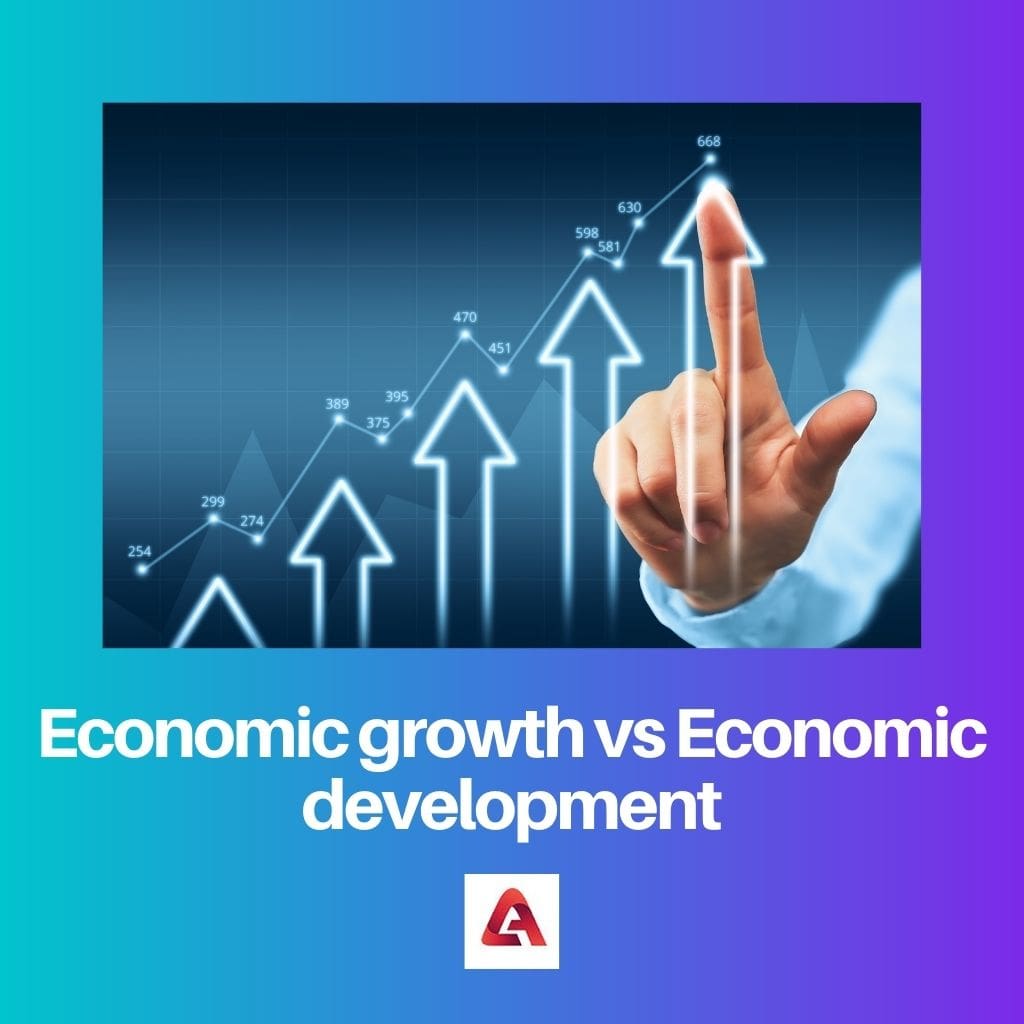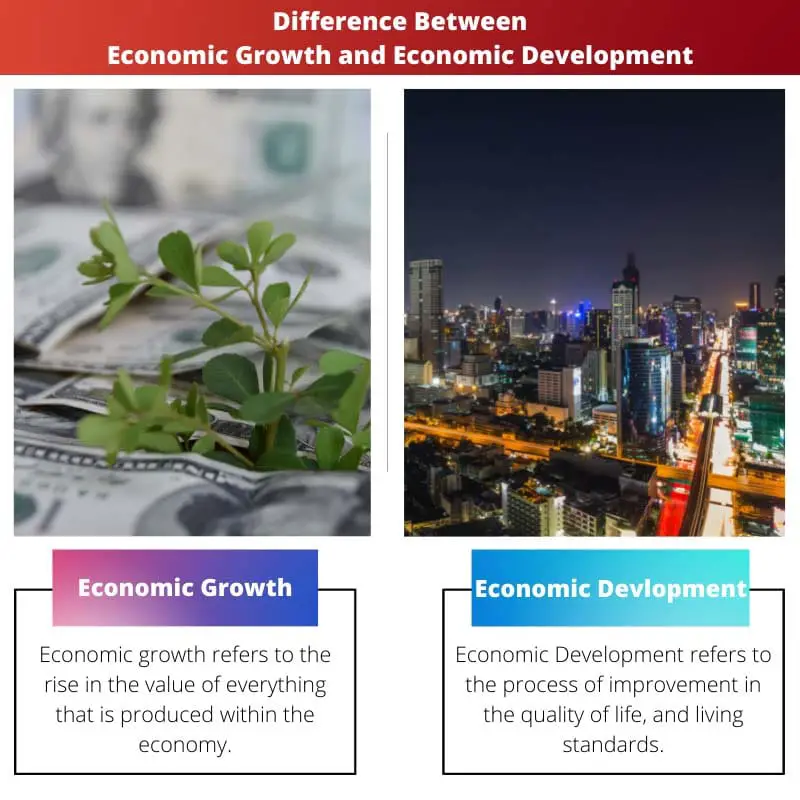Economic growth refers to the increase in a country’s output of goods and services over time, often measured by GDP growth. Economic development, on the other hand, encompasses broader improvements in living standards, education, healthcare, and income distribution, aiming for sustainable and inclusive progress.
Key Takeaways
- Definition: Economic growth represents an increase in a country’s output or Gross Domestic Product (GDP), while economic development involves qualitative improvements in living standards and well-being.
- Indicators: Economic growth is measured by GDP, while economic development considers various indicators like health, education, and income distribution.
- Sustainability: Economic growth can be short-term and resource-intensive, while economic development aims for long-term improvements and sustainable progress.
Economic Growth vs Economic Development
Economic growth refers to an increase in the production and consumption of goods and services in an economy over time, measured by GDP. Economic development, however, involves a more comprehensive change including structural changes, improved living standards, and technological progress.

Economic growth is the increase in the goods and services produced per person over some time. In contrast, economic development is the increase in output and improvement in a nation’s social and political welfare.
Comparison Table
| Feature | Economic Growth | Economic Development |
|---|---|---|
| Focus | Quantitative – Increase in the size of the economy | Qualitative – Improvement in overall well-being and quality of life |
| Measurement | GDP (Gross Domestic Product), per capita income | Human Development Index (HDI), poverty rates, literacy rates, life expectancy |
| Scope | Short-term – Focuses on immediate increases in production and output | Long-term – Aims at sustained improvement in living standards |
| Social aspects | May not necessarily address social inequalities | Focuses on factors like education, healthcare, and social inclusion |
| Environmental considerations | Not a primary concern | Aims for sustainable development that balances economic progress with environmental protection |
| Example | A country’s GDP increases by 5% in a year | A country reduces poverty rates and improves access to education and healthcare over a decade |
What is Economic Growth?
Economic growth is a fundamental concept in economics that refers to the sustained increase in the production of goods and services in an economy over time. It is a key indicator of a nation’s overall economic health and development. Understanding the various aspects of economic growth requires delving into its determinants, measurements, and implications.
Determinants of Economic Growth
1. Human Capital
Human capital, which encompasses the skills, education, and health of a nation’s workforce, plays a crucial role in fostering economic growth. Investments in education and healthcare contribute to a more skilled and productive labor force.
2. Physical Capital
The availability and quality of physical capital, including infrastructure, machinery, and technology, significantly impact economic growth. Adequate infrastructure and technological advancements enhance productivity and efficiency in production processes.
3. Technological Progress
Technological advancements drive innovation and improve efficiency in various industries. Investments in research and development (R&D) contribute to the development and adoption of new technologies, fostering economic growth.
4. Natural Resources
The abundance and sustainable management of natural resources also influence economic growth. Countries with access to diverse and well-managed resources often experience higher levels of economic development.
5. Institutional Framework
A stable and transparent institutional framework, including legal and regulatory systems, property rights, and governance structures, creates an environment conducive to economic growth. It provides the necessary framework for businesses to thrive and investments to flow.
Measurements of Economic Growth
1. Gross Domestic Product (GDP)
GDP is a primary indicator of economic growth, representing the total value of all goods and services produced within a country’s borders. It includes consumption, investment, government spending, and net exports.
2. Gross National Product (GNP)
GNP accounts for the total output produced by a country’s residents, both domestically and abroad. It considers the earnings of a nation’s citizens, regardless of their location.
3. Per Capita Income
Per capita income divides the total income of a country by its population, providing a measure of average income per person. It offers insights into the standard of living and economic well-being of the population.
Implications of Economic Growth
1. Poverty Reduction
Economic growth is often associated with a reduction in poverty rates. As incomes rise and job opportunities increase, a larger proportion of the population can access basic necessities and improve their living standards.
2. Employment Opportunities
Growing economies create more job opportunities, reducing unemployment rates. A thriving job market contributes to higher consumer spending, further stimulating economic growth.
3. Infrastructure Development
Economic growth allows governments to invest in essential infrastructure projects. Improved infrastructure, such as transportation and communication networks, enhances overall economic efficiency.
4. Social and Cultural Development
Increased economic prosperity can lead to advancements in education, healthcare, and cultural pursuits. These developments contribute to the overall well-being and quality of life for the population.

What is Economic Development?
Economic development refers to the sustained, long-term improvement in the economic well-being and quality of life of a community, region, or nation. It encompasses various facets, including economic growth, poverty reduction, increased employment opportunities, and enhanced living standards. Achieving economic development involves a multifaceted approach that integrates social, political, and economic factors.
Factors Influencing Economic Development
1. Human Capital
Human capital, comprising the knowledge, skills, and health of the workforce, is a critical factor in economic development. Investments in education, training, and healthcare contribute to a skilled and healthy labor force, fostering productivity and innovation.
2. Infrastructure Development
A robust infrastructure, including transportation, communication, and energy systems, is essential for economic development. Efficient infrastructure facilitates the movement of goods and people, reduces transaction costs, and attracts investment.
3. Natural Resources
The availability and sustainable utilization of natural resources play a significant role in economic development. Proper management of resources, including renewable and non-renewable ones, is crucial for long-term prosperity.
4. Political Stability and Governance
Political stability, effective governance, and the rule of law create an environment conducive to economic development. Transparent institutions, low corruption levels, and a reliable legal framework attract investment and promote economic growth.
5. Technological Progress
Technological advancements drive economic development by enhancing productivity, promoting innovation, and creating new industries. Access to and adoption of modern technologies contribute to increased competitiveness in the global economy.
6. Trade and Globalization
Engagement in international trade fosters economic development by providing access to new markets, technologies, and resources. Globalization allows nations to specialize in their comparative advantages, leading to increased efficiency and economic growth.
Strategies for Economic Development
1. Diversification of the Economy
Reducing dependence on a single industry or sector helps mitigate economic vulnerabilities. Diversification encourages the development of multiple sources of income, making the economy more resilient to external shocks.
2. Investment in Education and Healthcare
A well-educated and healthy population is more productive and innovative. Therefore, investments in education and healthcare are essential components of any effective economic development strategy.
3. Infrastructure Investment
Developing and maintaining infrastructure, such as roads, ports, and energy systems, enhances productivity and attracts private investment. Infrastructure development is a catalyst for economic activities and job creation.
4. Poverty Alleviation Programs
Addressing poverty through targeted programs ensures that the benefits of economic development reach all segments of society. Social safety nets, job training, and microfinance initiatives contribute to poverty reduction.
5. Innovation and Technology Adoption
Encouraging research and development, promoting innovation, and adopting modern technologies contribute to economic advancement. Governments and businesses should invest in creating an environment conducive to technological progress.

Main Differences Between Economic Growth and Economic Development
- Definition:
- Economic Growth: Refers to the increase in a country’s output of goods and services, typically measured by the Gross Domestic Product (GDP). It reflects the expansion of the economy’s capacity to produce.
- Economic Development: Encompasses a broader set of indicators, including improvements in living standards, poverty reduction, education, healthcare, and overall well-being. It goes beyond the quantitative aspects measured by GDP.
- Focus:
- Economic Growth: Primarily emphasizes the expansion of the economy’s size and the increase in production and income.
- Economic Development: Focuses on both quantitative and qualitative improvements in the standard of living and overall quality of life.
- Distribution of Benefits:
- Economic Growth: May not necessarily lead to equitable distribution of wealth and benefits, often resulting in income inequality.
- Economic Development: Aims to ensure that the benefits of growth are distributed more inclusively, addressing issues of poverty and social disparities.
- Factors Considered:
- Economic Growth: Mainly considers factors such as increased productivity, capital investment, and technological progress.
- Economic Development: Takes into account a broader range of factors, including education, healthcare, social justice, and environmental sustainability.
- Timeframe:
- Economic Growth: Can be a short-term focus, measured over specific periods, often in terms of quarters or years.
- Economic Development: Involves a more long-term perspective, considering sustainable and inclusive growth over generations.
- Sustainability:
- Economic Growth: May not inherently consider environmental sustainability and could lead to resource depletion.
- Economic Development: Aims for sustainable growth that considers environmental impact and long-term resource management.
- Policy Implications:
- Economic Growth: Policies often concentrate on promoting investment, innovation, and increasing productivity.
- Economic Development: Policies extend beyond economic factors, involving social policies, healthcare, education, and poverty reduction measures.
- Measurement:
- Economic Growth: Measured primarily by quantitative indicators like GDP growth rate.
- Economic Development: Requires a combination of quantitative and qualitative indicators, including Human Development Index (HDI), poverty rates, and education levels.


This article provides a great overview of the critical concepts and differences between economic growth and economic development. It’s essential to understand these principles to make informed decisions about resource allocation.
Absolutely, Lexi. I couldn’t agree more. It is vital to comprehend the varying aspects of economic growth and economic development to implement sustainable economic policies.
I found this article to be enlightening and insightful. Understanding the difference between economic growth and economic development is crucial in addressing broader economic challenges and social welfare issues.
I concur, Jane. This article does an excellent job of shedding light on these complex economic concepts and their implications on society and the economy.